

Andrew Maclean
2025 Honda Accord e:HEV RS vs Toyota Camry SL: Spec Battle
3 Months Ago
Genesis has given the G70 sedan a mid-life makeover to help it stand out from the crowd. It's pretty, but more needs to change before it's a class-leader.
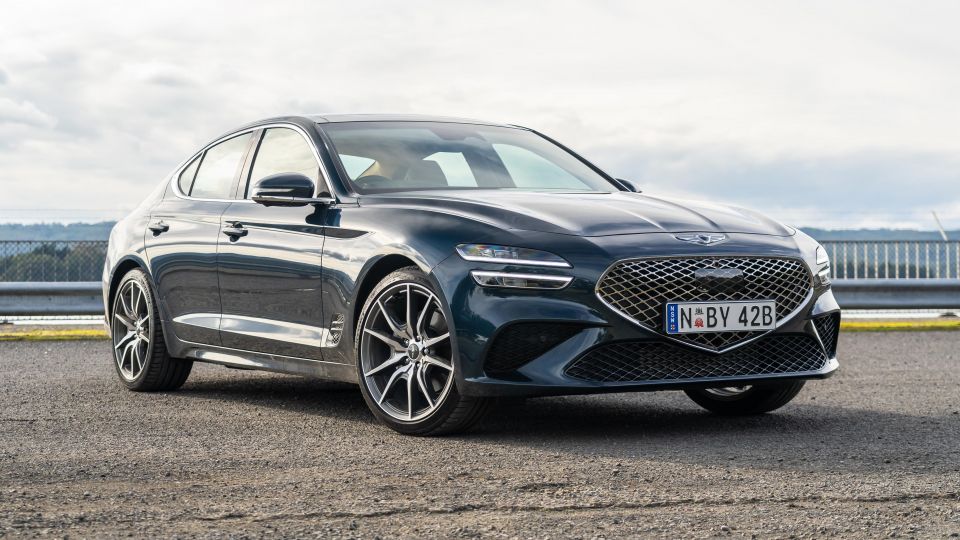
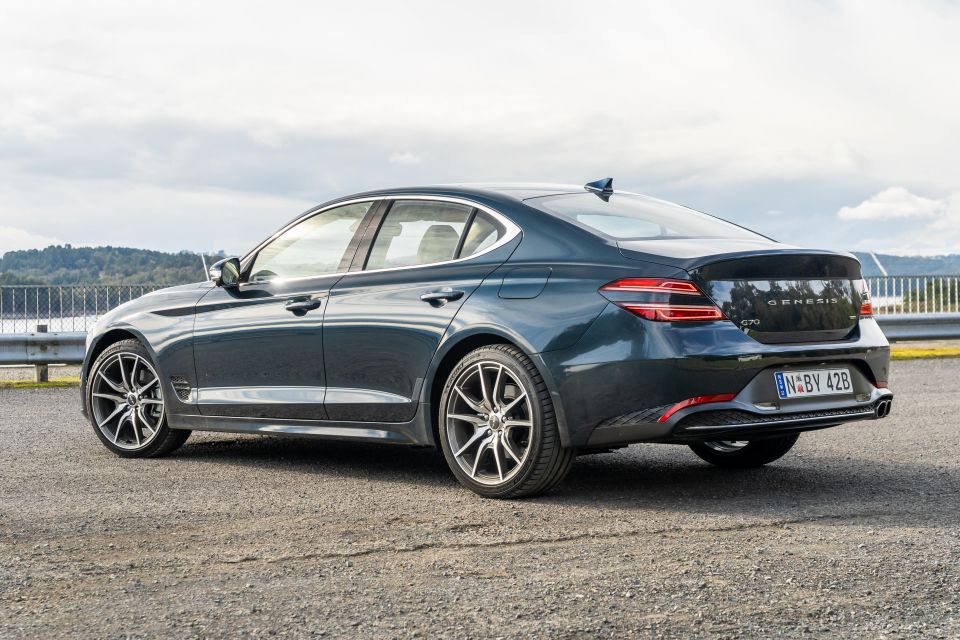

Contributor
New from
$59,300
excl. on-roads

Contributor
New from
$59,300
excl. on-roads


Contributor
New from
$59,300
excl. on-roads

Contributor
New from
$59,300
excl. on-roads
Quickly see how this car stacks up against its competition. Select any benchmark to see more details.
Where expert car reviews meet expert car buying – CarExpert gives you trusted advice, personalised service and real savings on your next new car.
Mid-sized sedans are a bit on the nose at the moment. Everyone wants an SUV, no-one seems to want cars like the BMW 3 Series, Audi A4, or Genesis G70.
That hasn’t stopped Genesis from giving the G70 a comprehensive overhaul, though.
The first G70 faded into the background a bit, with handsome but uninspiring looks and an interior that was nice enough, but nothing more. The new one is at no risk of doing the same.
With mini-Bentley looks and a plusher, more modern cabin, it’s almost unrecognisable compared to its predecessor.
Does it have the substance to match its newfound style?

Pricing for the Genesis G70 rose with the car’s mid-life update, pushing the base price of our 2.0T from $59,300 to $63,000 before on-road costs.
Our tester was considerably more expensive, though, because it was fitted with the $10,000 Luxury Pack.
Even at $73,000 before on-road costs, the G70 represents good value compared to more established German rivals.
The base BMW 320i is priced from $71,600 before on-road costs, but has a shorter list of standard inclusions, while the closest Audi is the A4 45 TFSI S line quattro, priced from $70,877 before on-roads. Mercedes-Benz will sell you a C200 for $69,376 before on-roads.
As for the range-topping G70 3.3T? It kicks off at $76,000 before on-road costs.
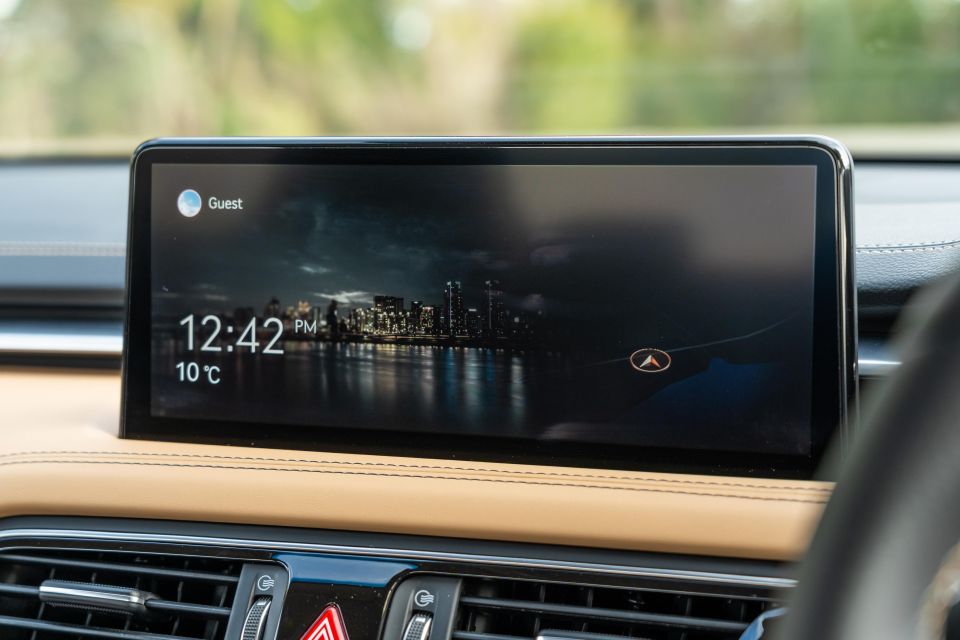
Standard equipment across the Genesis G70 range includes:
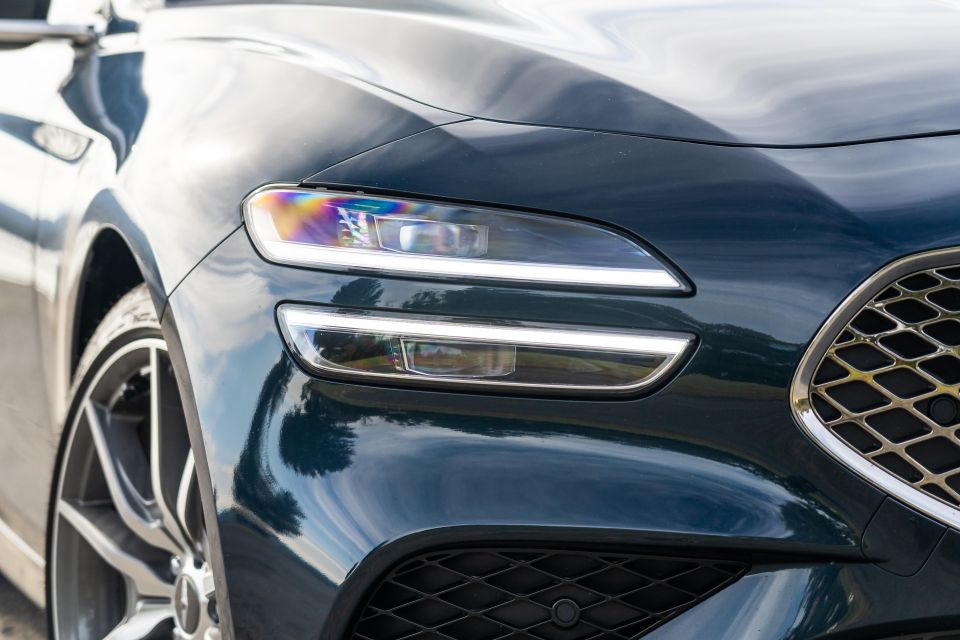
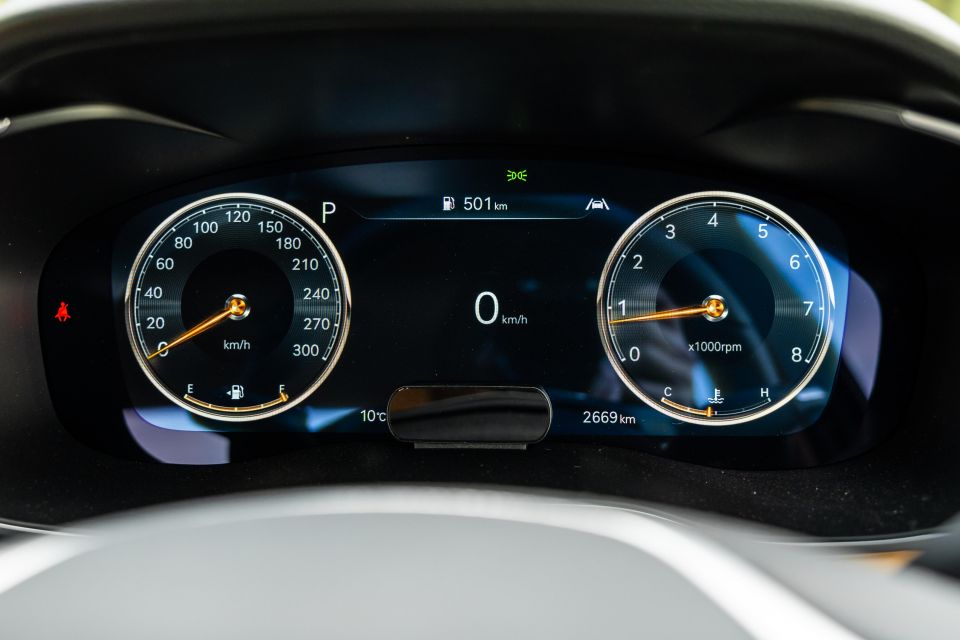
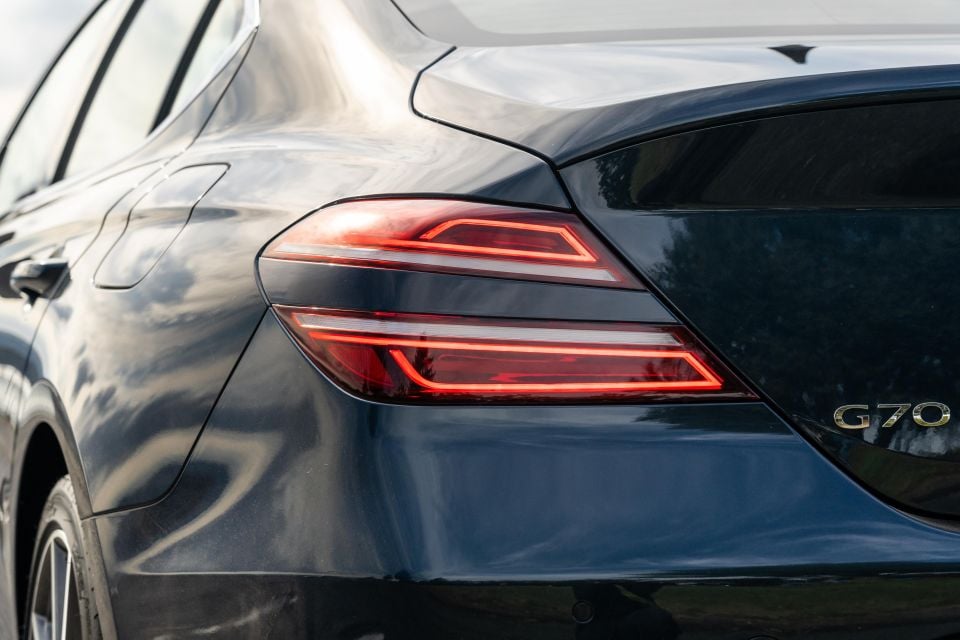
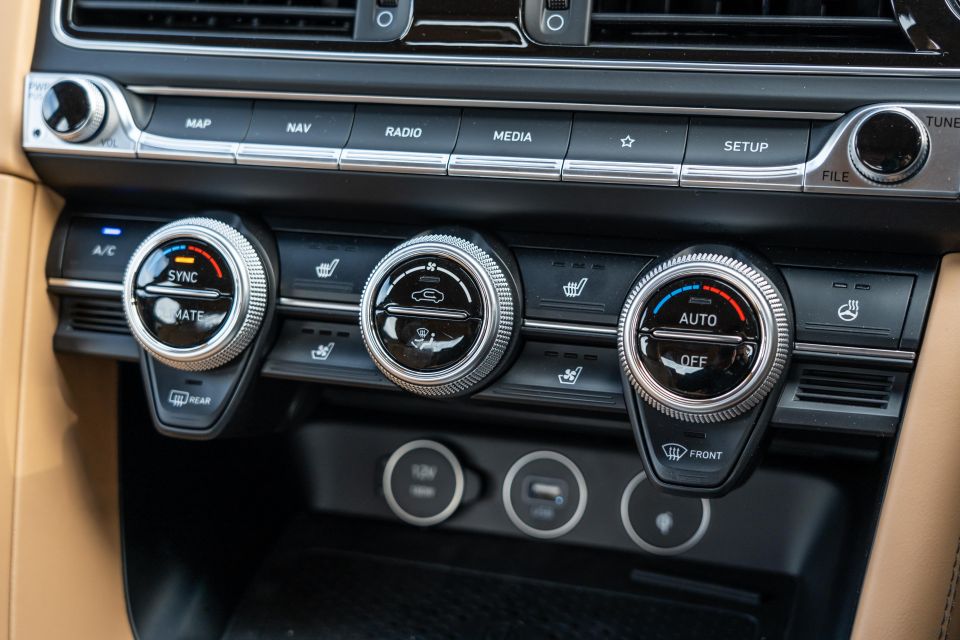
The $10,000 Luxury Package, available on both the 2.0T and 3.3T Sport, adds:

The Genesis G70 has a five-star safety rating from ANCAP, based on testing conducted by ANCAP in 2018.
It received an adult occupant protection score of 81 per cent, a child occupant protection score of 86 per cent, a vulnerable road user protection score of 69 per cent, and a safety assist score of 81 per cent.
Standard safety equipment across the range includes:
The Luxury Package’s digital instrument cluster also includes active driver attention monitoring.
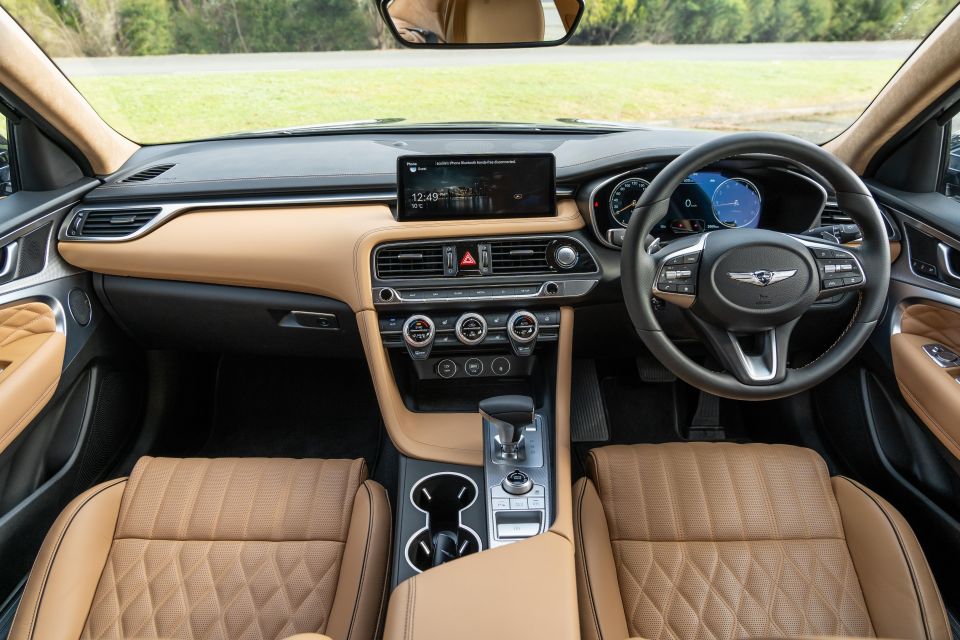
The G70 that first lobbed in Australia was a bit unremarkable, but the facelift (and the Luxury Pack) has turned it into a much more upmarket place.
The cognac-coloured Nappa leather seat trim looks classy and feels expensive, and the quilting on the seats and door trims adds a bit of Bentley-style visual excitement.
The driver sits low, and the seats have electric bolster and under-thigh extensions to really tailor the position, but the Genesis does feel small behind the wheel.
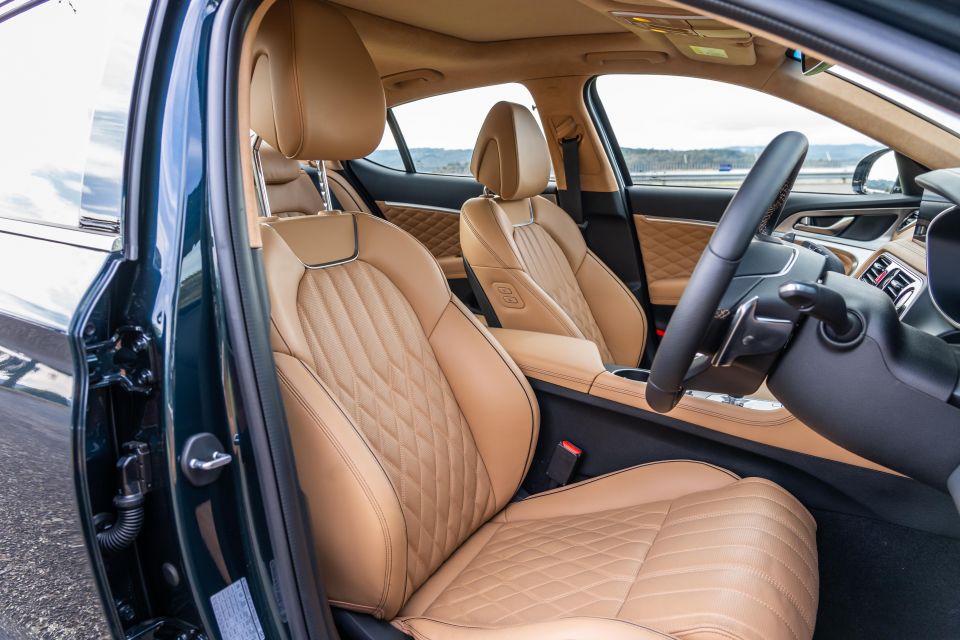
Tall drivers will have their hair brushing the headlining in sunroof-equipped cars, and legroom behind my driving position was non-existent. Not limited, not tight, literally non-existent.
Our tester also had an infuriating rattle from its overhead console on anything but billiard-smooth tarmac, which would immediately have had me back at the dealership demanding a fix.
All the buttons and dials on the dashboard are within easy reach, and feel of a relatively high quality, but the infotainment screen is perched too far away to comfortably use – even if you have long arms like me.
It’s a re-skinned take on the latest Hyundai and Kia system which, although functional, looks and feels a bit basic compared to the super-sophisticated systems common in German rivals.


The same goes for the 3D instrument cluster, which initially had me feeling a bit cross-eyed. It’s too magnified in its most aggressive mode, but you quickly adjust when it’s pared back slightly.
It’s a shame there’s no mapping, performance gauges, or more interesting layouts on offer. What’s the point of digital dials that just look like analogue dials?
Storage is good around the cabin. The door pockets are spacious, there’s a wireless phone charger under the dashboard, and the under-arm storage bin is perfect for wallets or snacks.
Things aren’t so rosy in the back, where legroom is tight and headroom is limited even by the low standards set by most mid-sized sedans.
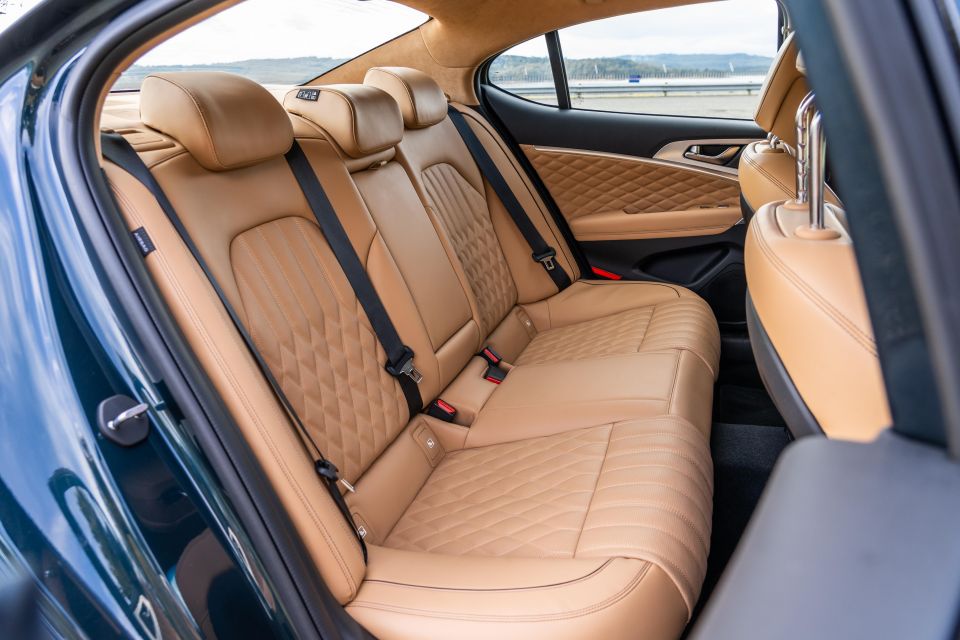
The G70 has a sexier roofline than a more traditional, three-box executive limousine, but it comes at the cost of practicality.
Then again, we know the people who used to buy cars like the G70 are now going for mid-sized SUVs, so rear-seat practicality might be less of a concern than it once was.
You get a fold-down armrest with cupholders, air vents, and USB charging back there, along with heated seats as part of the Luxury Pack.
Boot space is a claimed 330L with the rear seats in place. The space itself has a letterbox opening that makes it less practical for boxy items, and you’ll need to crouch down to spot items hidden in the boot’s deeper, darker corners.
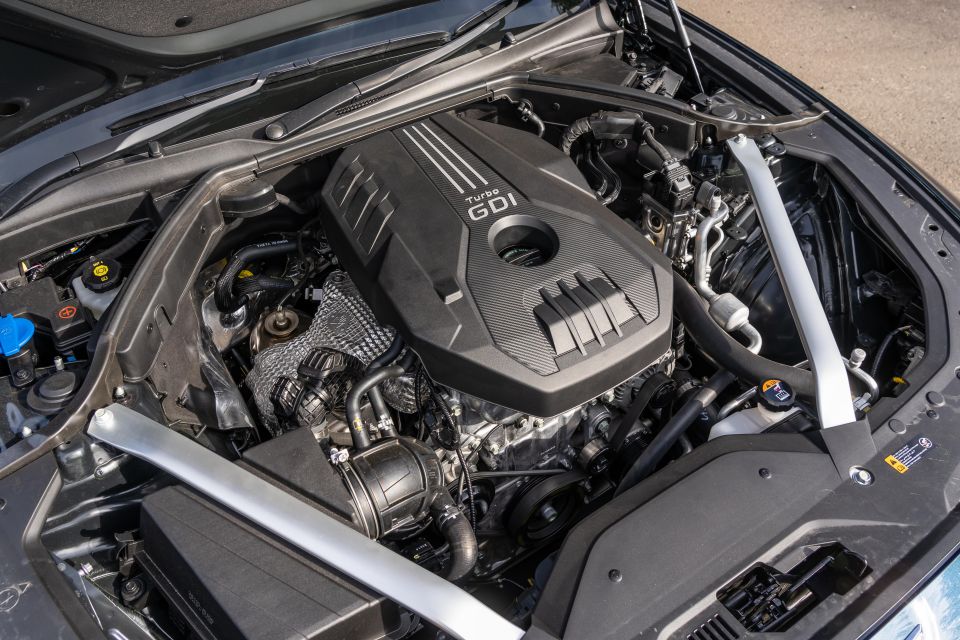
Power in the Genesis G70 2.0T comes from a 2.0-litre turbocharged petrol engine developing 179kW and 353Nm.
It’s rear-wheel drive, and has an eight-speed torque-converter automatic.
Claimed fuel economy is 9.0L/100km on the combined cycle.
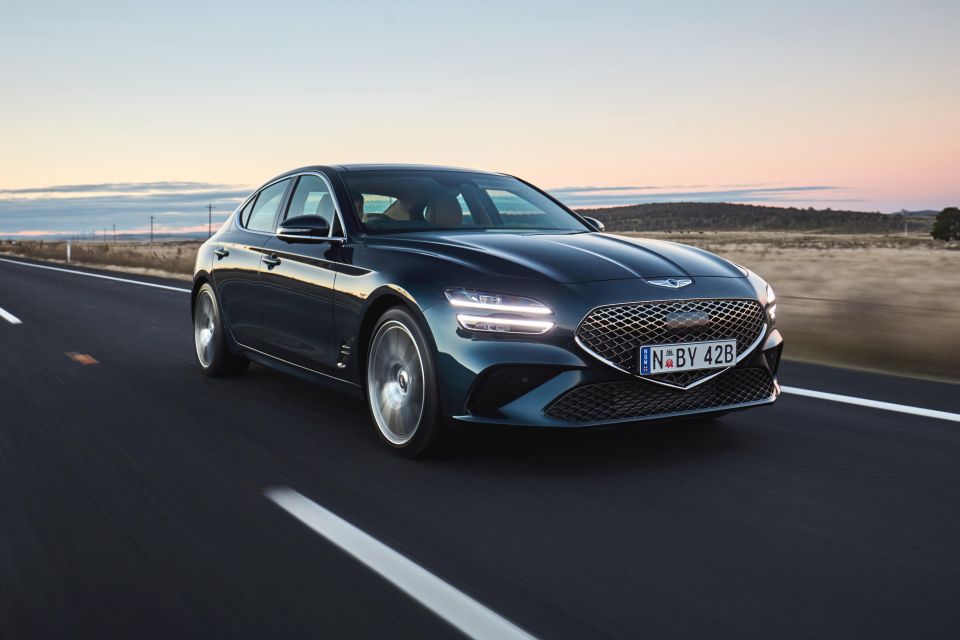
The G70 has clearly been designed to feel sporty, not dreary.
Mat the accelerator and it pauses for a couple of beats as the turbo greedily inhales air, and then disappears down the road riding a wave of mid-range torque.
Its claimed 6.1-second run to 100km/h is hot hatch quick, and it feels every bit that fast in the real world when it’s on the boil.
It’s a shame Hyundai hasn’t managed to make it sound good. There’s a fake noise generator, but the fake noise it generates is a strange, ethereal intake growl that doesn’t really fit with its grown-up sports sedan billing.
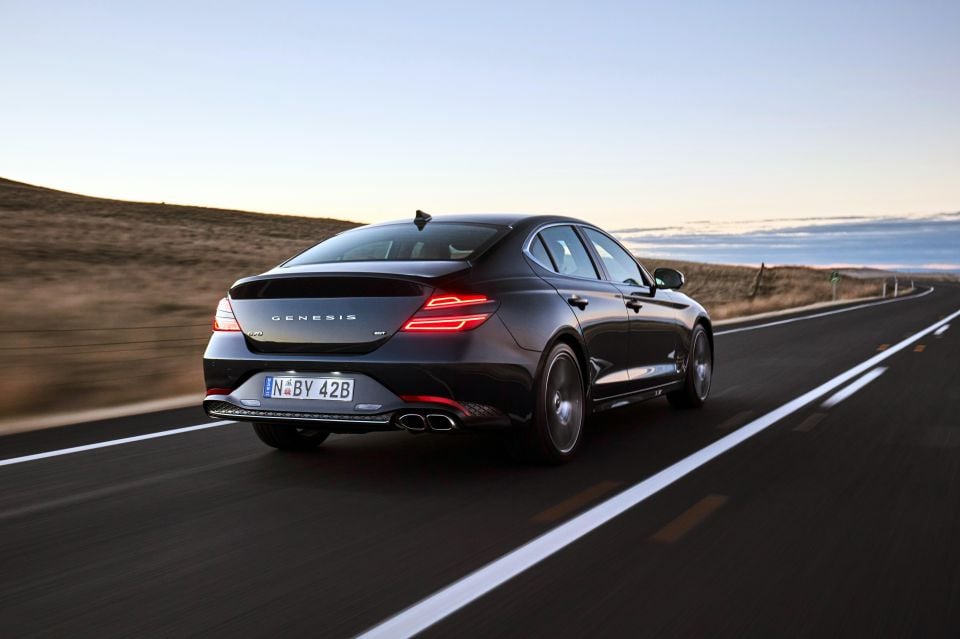
Turn it off and live with less obnoxious engine note, even though it sound a bit like a Dyson.
In normal mode, the eight-speed automatic transmission slurs smoothly to a tall gear to improve fuel economy, but it will kick down one, two gears when you’re in a hurry to drop you into the meat of the engine’s torque band.
It isn’t the crispest gearbox in the world, although flicking into sport does sharpen things up. It also makes it hold a lower gear for less shifting and more punch when you’re in a real hurry.
It also adds a bit of weight to the steering, and makes the digital dials go all angry and red. Nice.
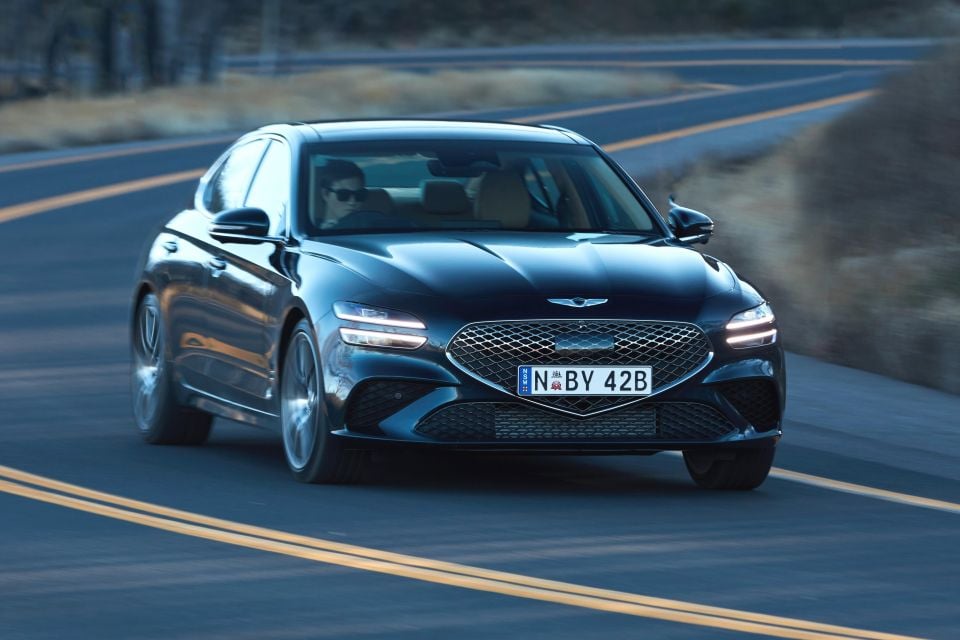
Set up as such the Genesis feels every bit like a sporty mid-sized sedan should. It feels balanced once you’re into a corner, with a sticky front end and classic rear-drive feeling when you get on the power.
It’s not particularly tail-happy, with an abundance of traction from the rear tyres and the slightly laggy turbocharged power delivery combining to make it feel like a corner carver more than a tail-out hooligan.
Then again, that’s perfectly appropriate.
There’s real talent in the Genesis chassis, particularly in the way it rides. Like the BMW 320i we compared the G70 with, it doesn’t have adaptive dampers, but it strikes an impressive balance between keeping its shapely body in check and keeping the driver comfortable.
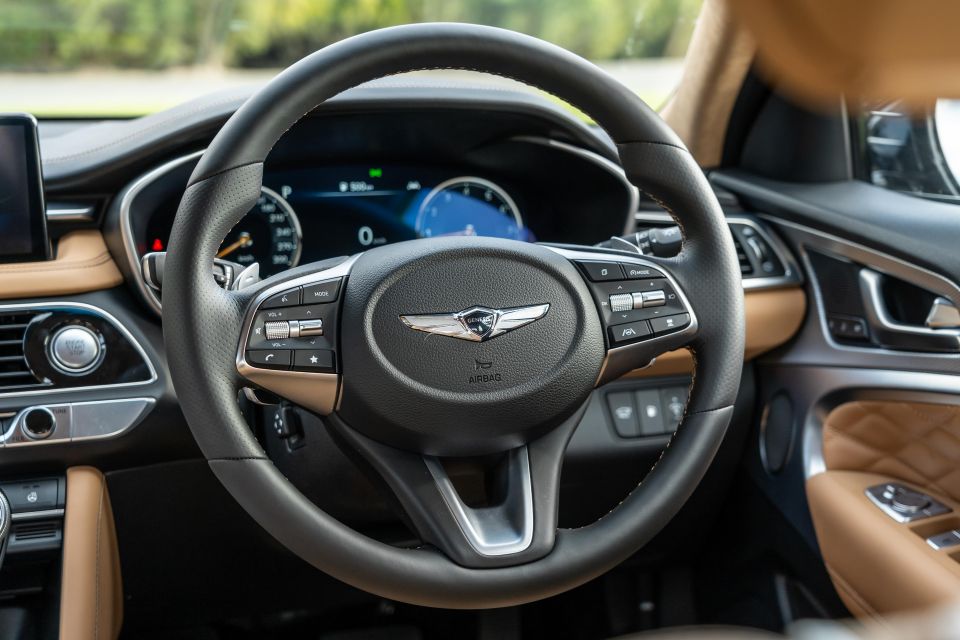
Where expert car reviews meet expert car buying – CarExpert gives you trusted advice, personalised service and real savings on your next new car.
It floats over lumps and bumps in the city that have some rivals feeling all stiff and choppy, but it doesn’t feel any looser in the corners.
Well done Genesis, it makes the G70 a friendly beast in the city.
At essentially any speed the Genesis feels every bit like a luxury sedan. It’s quiet and composed, with very little noise from the engine or tyres except for on some seriously rugged coarse chip stuff.
As for in town? There’s no excuse for scraped wheels or bumpers. Not only is the Genesis nice and compact, it’s backed by a full suite of cameras and sensors. It even projects guidelines on the road behind you when you’re parking.
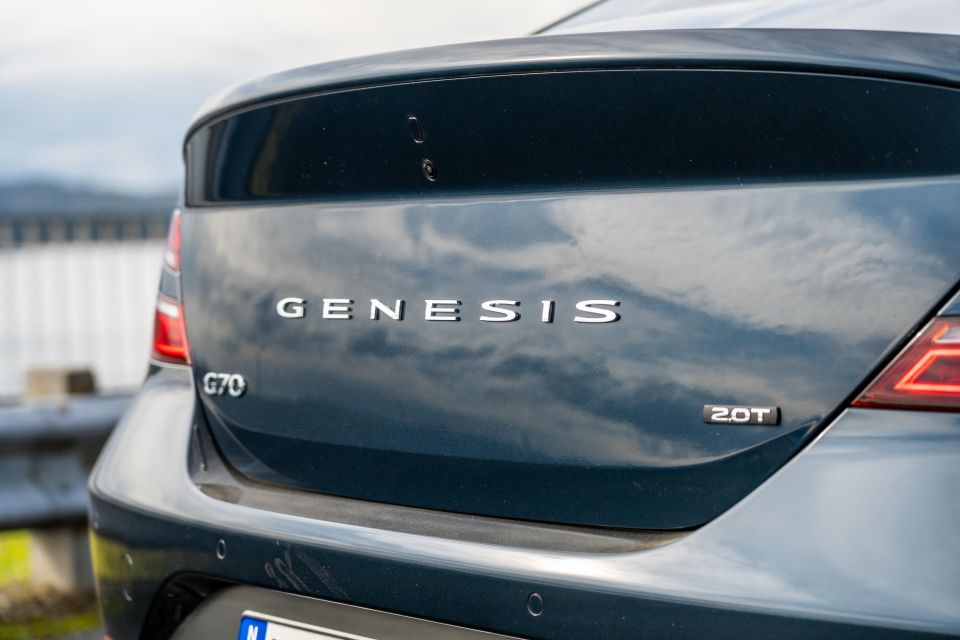
The 2021 Genesis G70 is covered by a five-year, unlimited-kilometre warranty and comes with five years or 50,000km of free scheduled servicing.
If you own a G70, you can also use the Genesis Concierge Service if you live within 70km of a Genesis Studio.
This means an employee will come to your house and leave you with a Genesis loan car while your car is taken to be serviced.
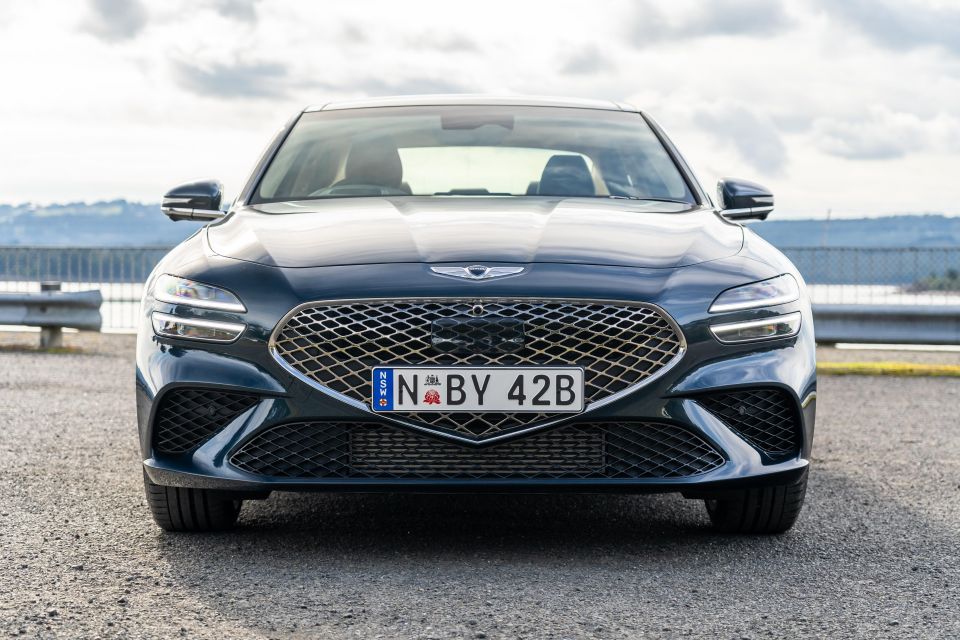
The Genesis G70 is a better car than its predecessor and an interesting alternative to the establishment, but it’s not going to give BMW too many sleepless nights.
Where the G80 and GV80 feel like ground-up cars designed using Genesis thinking, the G70 isn’t quite as confident in itself.
There’s no doubt it represents good value, there’s no doubt it drives nicely, and there’s no doubt it looks brilliant, but it’s not quite the rounded package it needs to be.

Click the images for the full gallery
MORE: Everything Genesis G70
Where expert car reviews meet expert car buying – CarExpert gives you trusted advice, personalised service and real savings on your next new car.
Scott Collie is an automotive journalist based in Melbourne, Australia. Scott studied journalism at RMIT University and, after a lifelong obsession with everything automotive, started covering the car industry shortly afterwards. He has a passion for travel, and is an avid Melbourne Demons supporter.


Andrew Maclean
3 Months Ago
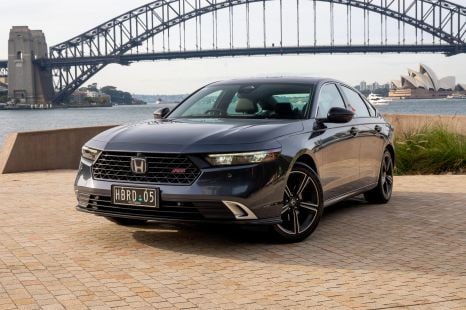

Andrew Maclean
2 Months Ago
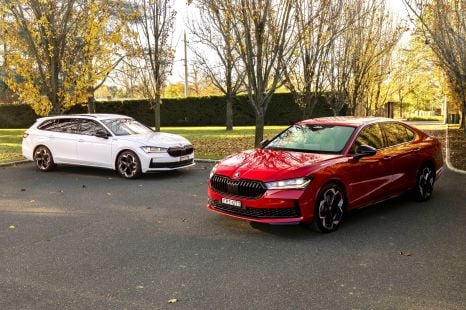

Max Davies
2 Months Ago
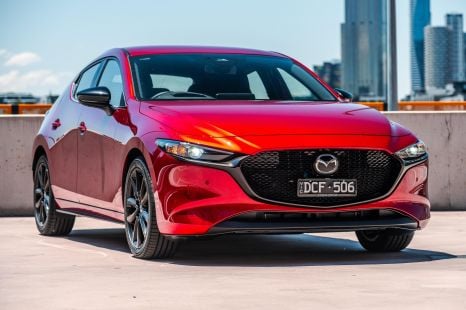

Josh Nevett
2 Months Ago
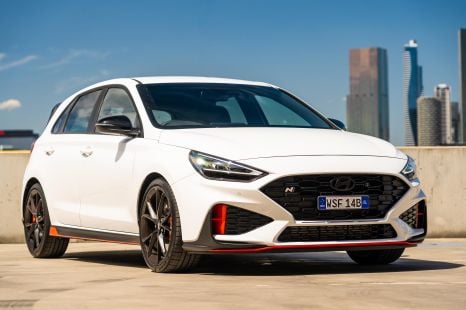

Josh Nevett
1 Month Ago
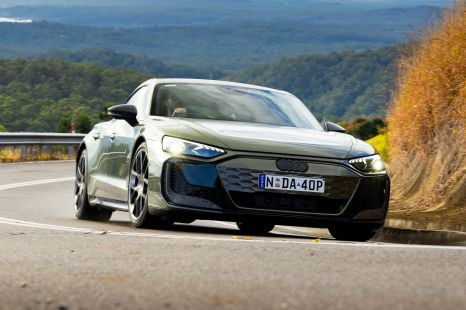

James Wong
1 Month Ago